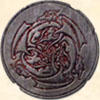Chapter 2 - Class - Specialists
Runecasters
Runecasters are rare and fearsome warriors. Although skilled in battle, their formidable power springs from their understanding of runes, ancient formulae that tap mystical powers. This combination of sword and magic makes them powerful allies and dangerous foes.
Though they are infrequent, warriors with the power to write magical runes do appear in the old tales of the viking way. Perhaps the most famous runecaster was Egil Skallagrimsson, hero of Egil's Saga. Descendant of the famous berserker Kveld-Ulf, Egil was a strong and hot-tempered man, skilled in runes and poetry.
Although they possess magical abilities, runecasters are members of the warrior group. They fight and save like warriors. Experience is earned as a warrior and they advance in levels as a ranger or paladin. They are allowed to use all those magical items normally available to warriors. However, the runecaster never gains any bonus hit points normally due for high Health scores.
Runecasters possess the knowledge of runes, magical words that when used properly generate or release special powers. Although they seem like spells (because they have magical effects), runes are very different. The source of all runes is the god Odin.
Runes must be learned, but are not memorized and forgotten like spells. There is no limit to the number of times a rune can be used in a single day. However, runes are difficult and complicated.
Casting a rune is time-consuming and may result in nothing but failure. Lastly, a character's selection of runes is severely limited.
In addition to his fighting ability, a first level runecaster begins the game knowing two runes. These runes are assigned by the DM and are never chosen by the player. No check is made to see if the character can learn these runes; it is assumed he has mastered that complicated art. Within the limits of rune-casting and the runes available, the character can use his knowledge at any time he feels appropriate.
Thereafter, each time the character advances in level, he has the opportunity to attempt to learn a new rune. Success is not automatic and a character can only make the attempt when he reaches a new level. The chance to learn the rune is based on the character's Knowledge. It is the same as that needed to learn a new spell. If the check is succeeded, the character can add the rune to his list of those already known. If it is failed, the character can never learn that particular rune, regardless of how high in level he rises.
As with the initial runes, the DM has final say over the knowledge gained. He may allow the player to pick the desired rune or offer the character a limited selection. Furthermore, the DM can either allow the rune to leap unbidden into the character's mind without prior experience or study; or he can require the character to find someone who will teach him the difficult art of forming the rune. There are no books of rune magic to study from!
As noted before, a character can only learn a new rune when he rises in level. Unlike spells (which can be learned anytime the character discovers a new one), a character cannot try to 'learn" a rune simply because he has seen it. Runecasting is a mystical art; it cannot simply be memorized by rote. Even if the character knows of the rune's existence, he must wait for a new level before attempting to understand its intricacies.
Because of their more ominous reputations, runecasters do not attract large bodies of followers. Upon attaining 9th level, the reputation of the runecaster is such that a certain number of men will follow his banner. Like the fighter, he determines those who stand by him using the Norse Followers Table. Unlike the fighter, he only attracts half the number listed (fractions rounded up). Those who do attend him are no less loyal for all this.
